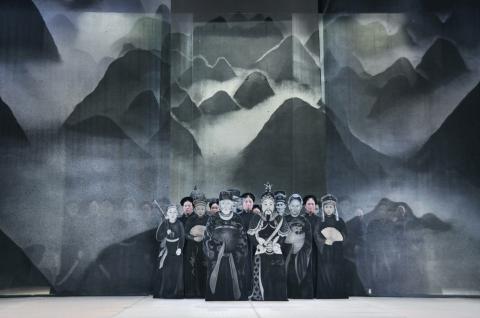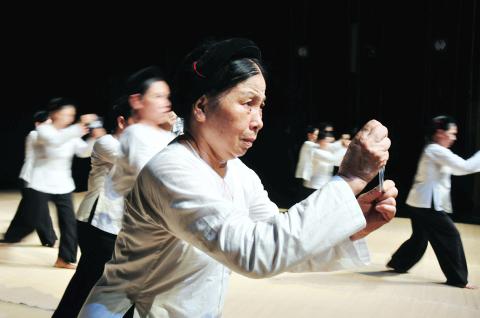Walking into the National Theater last Thursday night to see Cloud Gate Dance Theatre’s (雲門舞集) Nine Songs (九歌) was like returning to a much-loved haunt. The lotus pond at the front of the stage and the beautiful set reproducing Lin Yu-san’s (林玉山) wonderful Lotus Pond (蓮池) painting looked wonderful and much the same as remembered, even though all were brand new.
And that was true of the performance, since the casting for most of the 14 major parts has changed from five years ago.
Lee Ching-chun (李靜君) as the red-clad witch/shaman in previous productions was mesmerizing, appearing at times truly possessed as her body shook and rocked. However, Huang Pei-hua (黃珮華), who is one of two dancers who have taken on the iconic role, has made a good start at replacing Lee and is sure to grow further into the role.

Photo Courtesy of Company Ea Sola
In the Goddess of the Xiang River segment, the goddess is carried on stage standing motionless on two bamboo poles, trailing a very, very long white veil, looking very otherworldly — a presence enhanced by the ethereal, graceful, quivering moves of the role. Chou Chang-ning (周章佞) was amazing in this role in the last production, but Huang Mei-ya (黃媺雅) more than matched her on Thursday night. Chou will be alternating the role with Huang in the current run.
The one seemingly irreplaceable role in Nine Songs is that of God of the Clouds in the second act. Wu I-fang (吳義芳) created the role in the original production and reprised it five years ago, making the impossible seem possible, for the masked, loin-clothed God of the Clouds enters the stage on the back of two retainers and never touches the ground as he strides along, shifting his feet from one man’s shoulder to the other, posing in an arabesque or being lowered for a series of slow-motion rolls across his bearers’ backs. However, young Yeh Wen-pang (葉文榜), who has been a stalwart of Cloud Gate 2 for many years, performed admirably in the role. It was wonderful to see him dance with the main company.
Artistic director Lin Hwai-min (林懷民) said in an interview that he had trimmed at least one of the segments and tightened the piece up, but the difference was unnoticeable. One left the theater fully satisfied, and happy that Nine Songs has returned to the company’s repertoire.

Photo Courtesy of Company Ea Sola
Cloud Gate will be performing Nine Songs at the National Theater tonight through Sunday before beginning a six-city tour around the nation. However, all but the NT$400 seats have sold out for tonight through Friday night and the weekend shows are completely sold out. Tickets to shows outside Taipei are also moving fast.
What didn’t move very fast at all was the Company Ea Sola’s production of Drought and Rain (旱‧雨) at the Novel Hall on Saturday night. The 70-minute piece turned out to be more of an austere example of performance theater than a dance work, with traditional Vietnamese song given a major role.
The elderly farmers turned performers were nimble enough, but it would have been exciting it they had been given a bit more to do. There was too much repetition in their moves, though some of the images created — the entrance with life-sized cardboard cutouts of ancestors through the dark mists of time; the troupe draped in white rain ponchos, faces hidden under conical straw hats; the in-your-face presentations of hand-sized portraits of lost loved ones — stick with the viewer long after the show is over.
The six musicians, divided in half on either side of the stage were a strong presence throughout, and the theater had Chinese and English subtitles projected on either side of the proscenium of the Vietnamese lyrics, though the poetry was sometimes too metaphysical to be easily decipherable.
The Novel Hall Dance series, Asia and New Look, was set to continue with the Tao Dance Theater (陶身體劇場) from Beijing, on Oct. 13 and Oct. 14. However, one of the four Tao dancers has broken a foot and the troupe was forced to cancel the Taipei shows, though Novel Hall staff say they will try to bring them next year.
Next up in the series will be New Zealand’s Mau Dance from Oct. 19 to Oct. 21, with Birds with Skymirrors.

In the March 9 edition of the Taipei Times a piece by Ninon Godefroy ran with the headine “The quiet, gentle rhythm of Taiwan.” It started with the line “Taiwan is a small, humble place. There is no Eiffel Tower, no pyramids — no singular attraction that draws the world’s attention.” I laughed out loud at that. This was out of no disrespect for the author or the piece, which made some interesting analogies and good points about how both Din Tai Fung’s and Taiwan Semiconductor Manufacturing Co’s (TSMC, 台積電) meticulous attention to detail and quality are not quite up to

April 21 to April 27 Hsieh Er’s (謝娥) political fortunes were rising fast after she got out of jail and joined the Chinese Nationalist Party (KMT) in December 1945. Not only did she hold key positions in various committees, she was elected the only woman on the Taipei City Council and headed to Nanjing in 1946 as the sole Taiwanese female representative to the National Constituent Assembly. With the support of first lady Soong May-ling (宋美齡), she started the Taipei Women’s Association and Taiwan Provincial Women’s Association, where she

Chinese Nationalist Party (KMT) Chairman Eric Chu (朱立倫) hatched a bold plan to charge forward and seize the initiative when he held a protest in front of the Taipei City Prosecutors’ Office. Though risky, because illegal, its success would help tackle at least six problems facing both himself and the KMT. What he did not see coming was Taipei Mayor Chiang Wan-an (將萬安) tripping him up out of the gate. In spite of Chu being the most consequential and successful KMT chairman since the early 2010s — arguably saving the party from financial ruin and restoring its electoral viability —

It is one of the more remarkable facts of Taiwan history that it was never occupied or claimed by any of the numerous kingdoms of southern China — Han or otherwise — that lay just across the water from it. None of their brilliant ministers ever discovered that Taiwan was a “core interest” of the state whose annexation was “inevitable.” As Paul Kua notes in an excellent monograph laying out how the Portuguese gave Taiwan the name “Formosa,” the first Europeans to express an interest in occupying Taiwan were the Spanish. Tonio Andrade in his seminal work, How Taiwan Became Chinese,